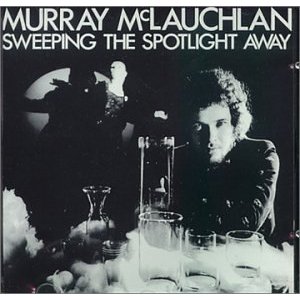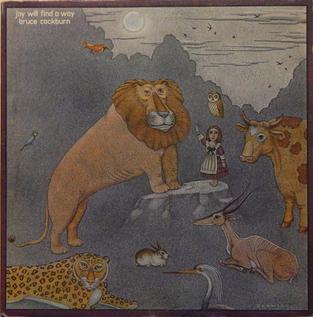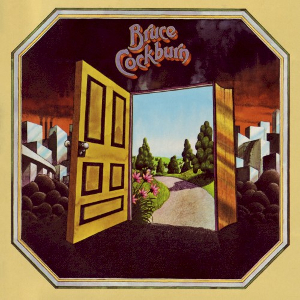
Bruce Douglas Cockburn is a Canadian singer-songwriter and guitarist. His song styles range from folk to jazz-influenced rock and his lyrics cover a broad range of topics including human rights, environmental issues, politics, and Christianity.
David Wiffen is an English-Canadian folk singer-songwriter. Two of his songs, "Driving Wheel" and "More Often Than Not", have become cover standards.

Baby Beluga is a children's music album by Canadian children's entertainer Raffi, released in 1980. The lead song is about a young beluga whale that "swim[s] so wild and [...] free".
True North Records is a Canadian independent record label.

Song from the Street was the debut album of Canadian singer-songwriter Murray McLauchlan, released in 1971. This album is only the fourth release by fledgling Canadian label True North Records, and McLauchlan its second Singer-Songwriter artist joining Bruce Cockburn.
Luke & The Apostles was a 1960s blues group from Toronto, Ontario, Canada. The band is known for their 1967 hit "Been Burnt". Band members included Canadian guitarist Mike McKenna, Luke Gibson, Peter Jermyn, Jim Jones, and Pat Little. The band is considered to be innovators of the electric blues in the Toronto music scene of the sixties.
The Flying Circus were a short-lived Toronto-based group fronted by singer/songwriter, Bruce Cockburn. The band, which was active between late 1967 and early 1968, also featured Neil Merryweather and future Mapleoak members, Marty Fisher and Gordon MacBain.
The Modern Rock Quartet (MRQ) was a Canadian jazz-rock band put together by former Luke & The Apostles keyboard player Peter Jermyn with several musicians who had played with Bruce Cockburn in the final lineup of The Esquires.

Coast to Coast Fever is the third solo album by Canadian singer-songwriter David Wiffen. He is assisted on the album by fellow Canadian folkie Bruce Cockburn, who plays guitar, bass and celeste, and also produced the album. The best-known tracks are "Skybound Station", "Coast to Coast Fever", "Smoke Rings", "We Have Had Some Good Times" and "Lucifer's Blues". Seven of the ten songs were written by Wiffen.

Sweeping the Spotlight Away is a 1974 album by Canadian singer-songwriter Murray McLauchlan.
3's a Crowd was a folk rock band from Vancouver that existed from 1964 to 1969, spending most of that time in Toronto and Los Angeles. The group had some moderate Canadian chart success, but is particularly notable for the wide range of Canadian musicians who passed through its ranks and would later establish successful careers of their own, including Bruce Cockburn, Colleen Peterson, David Wiffen, Trevor Veitch, and Brent Titcomb. 3's A Crowd is also remembered for its association with Cass Elliott, who co-produced the group's sole album release.

Joy Will Find a Way is the sixth full-length album by Canadian singer/songwriter Bruce Cockburn. The album was released in 1975 by True North Records and received a gold certification in Canada in 1985.

Bruce Cockburn is singer/songwriter Bruce Cockburn's debut album. The album was originally released in 1970 and is the first album to be released by True North Records. The album received a Canadian gold record award in 1995. For his debut, the artist favors sparse arrangements, consisting primarily of Cockburn on acoustic guitar with some support from Dennis Pendrith on bass. The lyrics are introspective in tone, unlike the more politically charged themes Cockburn would explore later in his career.

Inner City Front is the eleventh full-length album by Canadian singer/songwriter Bruce Cockburn, released in 1981 by True North Records.

William Alfred Hawkins was a Canadian songwriter, poet, musician and journalist, most notable for his contributions in the 1960s to Canadian folk rock music and to Canadian poetry. His best known song is "Gnostic Serenade", originally recorded by 3's a Crowd.
Dancing Alone: Songs of William Hawkins is a 2008 tribute album, released by True North Records. On the record, a number of Canadian artists pay tribute to the songs of William Hawkins, an influential Canadian songwriter and poet.

Humans is the tenth full-length album by Canadian singer/songwriter Bruce Cockburn. Humans was released in 1980 by True North Records.

Sunwheel Dance is the third studio album by Bruce Cockburn, released in 1972. It was remastered and released by Rounder Records in 2005 with two bonus tracks. For the most part, Cockburn's lyrics here continue to be primarily introspective and spiritual, bolstered by sparse acoustic arrangements. However, Cockburn does make his first foray into political commentary on the anti-war diatribe "Going Down Slow," which also marks the artist's first utilization of a full band on record. The album has sold steadily through the years, receiving a Canadian gold record award in 1988.

Night Vision is the fourth studio album by Canadian singer-songwriter Bruce Cockburn released domestically on True North Records. The album earned Cockburn's first Canadian gold record award in 1979. It was the first time in his solo career that Cockburn recorded with a band. The album's artwork is an adaptation of a painting by Alex Colville entitled "Horse and Train".

The Trouble with Normal is a 1983 studio album by Canadian singer-songwriter Bruce Cockburn. The album contains nine songs. It marks a continuing shift from Cockburn's early folk-influenced and "mystic" acoustic works, featuring electric guitar and synthesizers, but the lyrical themes build on earlier albums.












